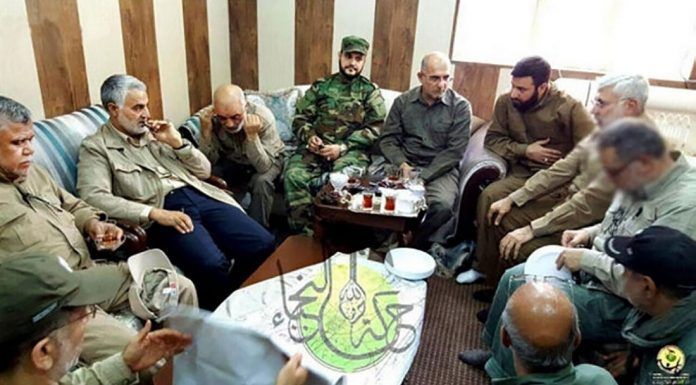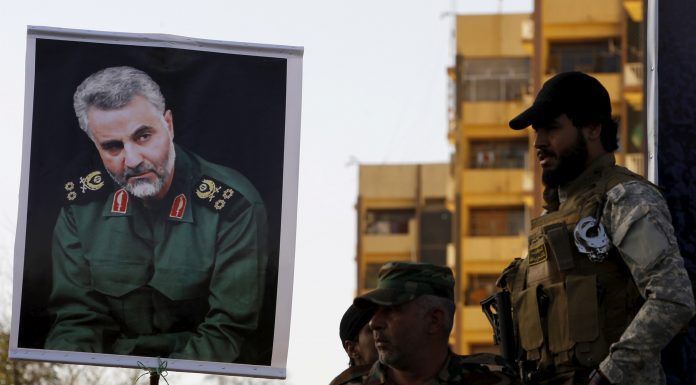March 14 – Major General Qasem Soleimani, the head of Iran’s Quds Force, was awarded the Order of Zulfiqar to stave off financial concerns from Iran-backed militia groups, Raman Ghavami a Middle East analyst has said in an interview with Kayhan Life.
Soleimani is the first Iranian general to receive the country’s highest military honor since the 1979 Islamic Revolution. The award comes as Iran’s government, which is under growing economic pressure, struggles to fund allied militia groups across the region. A report from Abu Dhabi newspaper The National in 2018 said that Iran had previously given Hezbollah $700 million a year.
Iran’s President Hassan Rouhani told Fars news agency on Sunday that the Iranian commander had received the award, though the exact date Soleimani was decorated is not known. The commander of the Quds Force, a wing of Iran’s Revolutionary Guard Corps (IRGC) which carries out intelligence activities and extraterritorial operations, has historically shunned the political stage but has become more visible in the last few months as tensions mount between the U.S. and Iran.
Raman Ghavami, who works for a UK-based consultancy firm specializing in Insurgency and Counter-Insurgency analysis, told Kayhan Life that the award was given in an attempt to persuade militia groups that Iran’s troubles were only temporary:
“Soleimani’s recent visibility is because of the pressures Iran faces at home and its shortage of financial support for militia groups across the region. Boosting Soleimani’s profile in the media says to Iran-backed militia that Tehran’s current economic situation of not being able to finance them is temporary and that Qasem Soleimani isn’t going anywhere.”
The imposition of U.S. sanctions on Iran and the country’s economic troubles have affected state-supported organizations like Hezbollah, which Kayhan Life reported in February was having financial difficulties. According to a report from Israeli newspaper Haaretz on March 9, Hezbollah has begun to ask for donations from its supporters, as sanctions on the group take hold. Hezbollah was listed as a terrorist organization by the United States in 1997. Washington has steadily increased financial sanctions against the movement.
Government officials have expressed doubts over whether the country’s domestic army can cope with the nationwide protests over pay and corruption long-term. According to Iranian media outlet Asr-e Iran, Musa Ghazanfarabadi, the head of Tehran’s Revolutionary Court, told Islamic scholars in the city of Qom on March 6 that if Iran’s military was unable to prevent the government from being overthrown then officials would bring in militia groups to protect the regime.
Speaking at a ceremony at the Qom Seminary, Iran’s largest Islamic college, Ghazanfarabadi told attendees, “If we do not help the revolution, then the Mahdi Army of Iraq, the Fatimid Brigade of Afghanistan, the Zainab Brigade of Pakistan and the Houthis in Yemen will come and help the revolution.”
Ghavami noted that Supreme Leader Ayatollah Khamenei’s decision to award Soleimani with the Order of Zulfiqar was also meant to counter doubts over central government’s ability to manage the country’s unrest.
“Following threats from Iranian officials to use foreign militia to protect the regime in recent days, awarding Soleimani is an indication that the Islamic Republic of Iran is feeling defensive,” he said. “The Islamic Republic faces unprecedented pressure from the people, so the only way to secure the continuation of the regime is to use its most loyal forces to keep the situation under control. Promoting the IRGC inside the country is another important reason behind Soleimani’s appearance. The IRGC is seen as the ideological army of Iran and so any efforts to increase the corps’ effect is crucial to its existence. The timing of the award could be seen as part of Ayatollah Khamenei’s political and military repositioning of figures who are loyal to him.”
General Soleimani is considered by military experts to be one of the shrewdest commanders in the Middle East today. A new BBC documentary airing on March 14 entitled, “Shadow Commander: Iran’s Military Mastermind,” includes an interview with former CIA director David Petraeus who calls Soleimani “a very capable charismatic, skilled, professionally competent, diabolically evil human being.”
Ghavami told Kayhan Life that the Iranian government’s focus now was on maintaining the status quo and that Iran’s Supreme Leader saw Soleimani as an opportunity to achieve that goal.
“Given Iran’s current situation, it is likely that Tehran will continue to increase its military presence inside the country,” he said. “The roles of the IRGC, its Quds forces and Soleimani are important for the supreme leader in order to make sure all forces and commanders fall in line. In essence, Tehran’s current policy is to protect itself at this point rather than expand its influence. The best way to do that is to use Soleimani’s reputation inside the country.”



